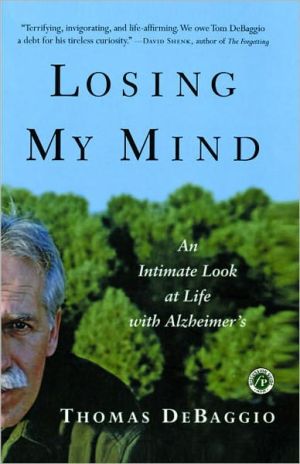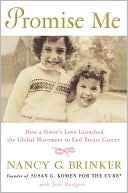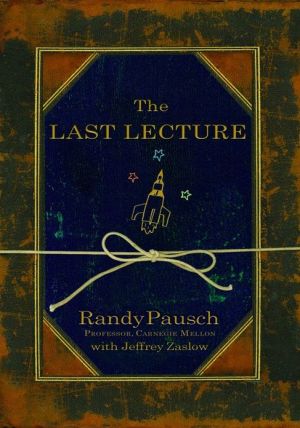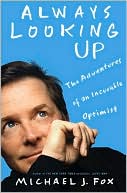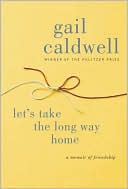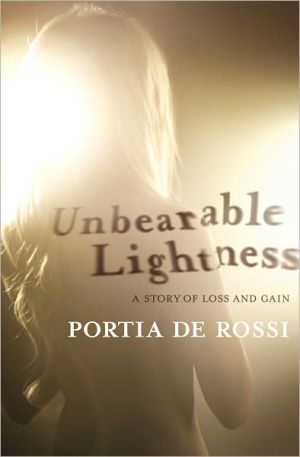Losing My Mind: An Intimate Look at Life with Alzheimer's
"We are foolish, those of us who think we can escape the traps of aging," writes Tom DeBaggio. "I was one of them, dreaming of a perfect and healthy old age....Now, at fifty-eight, I realize the foolishness of my dreams as I watch my brain self-destruct from Alzheimer's." Losing My Mind is DeBaggio's extraordinary account of his early onset Alzheimer's, a disease that "silently hollows the brain" and slowly "gobbles memory and destroys life." But with DeBaggio's curse came an unexpected...
Search in google:
Tom DeBaggio turned fifty-seven in 1999. One day he mentioned to his doctor that he seemed to be stumbling into forgetfulness. DeBaggio was diagnosed with early onset Alzheimer's. He immediately began charting the ups and downs of his failing mind. Here is the captivating tale of DeBaggio's battle to stay connected with the world... Book Magazine Hideous irony, that a memoir about memory loss could be so unforgettable. At fifty-seven, DeBaggio, a commercial gardener who has written books on the subject, finds himself in the early stages of Alzheimer's disease. Writing from the afflicted point of view was a difficult undertaking. "After 40 years of pussyfooting with words," he says, "I finally had a story of hell to tell." The author puts on a brave face but thankfully doesn't try to maintain it throughout. The book's unconventional narrative combines childhood memories with excerpts from medical reports; its choppy style is a necessary consequence of DeBaggio's diminishing condition. Oddly, the approach helps him explain the disease that is fast becoming unexplainable for him. DeBaggio frets that he lived "an ordinary life by definition"—only to conclude that the hand he's been dealt is anything but ordinary. This amazing book is both a lament and a muted kind of celebration. "It is the most exciting time in my life," DeBaggio acknowledges. "As it should be." —James Sullivan
from Losing My Mind\ That January, my fifty-seventh birthday, was pleasant and eventful and I began to adjust to middle age. I no longer noticed how small facial lines became wrinkles. I was active and happy. My son Francesco, home from California, joined Joyce and me in the family herb-growing business in Virginia. I was equipped with a thin body free of aches and pains. I looked forward to a life to rival my Midwestern grandmother's 104 years. I was buoyant and displayed, occasionally, the unbecoming arrogance of youth.\ Then came a beautiful spring day later that year. It was the day after the tests were finished and the results reviewed. It was the day I was diagnosed with Alzheimer's. What time had hidden was now revealed. Genetic secrets, locked inside before my birth, were now in the open. I became a new member in the parade of horror created by Alzheimer's.\ At first I viewed the diagnosis as a death sentence. Tears welled up in my eyes uncontrollably; spasms of depression grabbed me by the throat. I was nearer to death than I anticipated. A few days later I realized good might come of this. After forty years of pussyfooting with words, I finally had a story of hell to tell.\ *\ My parents grew up in an orderly, gentle time, or so they remembered it. Their epoch was also full of dirty secrets, enslavement, lynching, and two murderous convulsive world wars. It was a time to need luck. They escaped the influenza epidemic of 1918 and made it through the Great Depression of the thirties when food and jobs were scarce. Luck was with them in small Iowa towns named Eldora and Colfax.\ Instead of focusing on the explosive reality of their time, they created a happier personal interval of their own imagining. This in turn created a great optimism in me and a gentle narrative of childhood tranquility. Soon I was scared and uplifted, as were they, by the time of my time, a world of conflagration, disorder, hope, ugliness, great beauty, and unnecessary death. Yet the imaginative world of kindness and promise they passed to me always remained untouched by the ugliness of congested cities, immoral wars, and encompassing greed.\ Here I am at the moment of truth and all I can muster are hot screams and scribbled graffiti torn from my soul. Moments of slithering memory now define my life.\ After a short, mild winter, a vivid spring settled around us. The weather was tame and herbs filled a sunny patch next to the greenhouse. They were strong and vigorous now, especially the rosemaries, the thymes, the lavenders. Their scents perfumed the air when I brushed by them.\ The sun warmed the earth steadily and it was possible to spade and plant a kitchen garden with early seed crops of succulent lettuce to sweeten and color our meals. It was a spring in which you could be happy and a little carefree. There was much the earth had to say and you could hear it if you stayed quiet and listened intently.\ There was something else that spring and it was unnamable. As with all unknowns, it was unsettling and had nothing to do with the weather. It was not something that gentle rains, bright sunny days, and an optimistic outlook would cure. It was an anonymous presence, yet I could feel its uneasy cadence. My memory, which had been a sacred touchstone, was failing long before I expected. I was losing the ability to remember things important to me. I had difficulty recognizing the names of many of my plants, and even friends I saw infrequently. I was fifty-seven this year, and not eager to acknowledge that now I might be tied to a teetering mind that had begun a slow descent into silence.\ A time or two I complained out loud that I could not remember things that the year before had been brightly colored and detailed. I brushed off those incidents as forgetfulness due to stress, and there was stress aplenty, as there had been always. Stress and worry were steady partners in my backyard farming, just as it was for the farmer in the great, flat Midwest with hundreds of acres of rich, black earth.\ I made a living in my backyard for twenty-four years, growing and selling as many as 100,000 herb and vegetable plants from my greenhouse each spring. The entire operation, situated on a 5,000-square-foot lot, contained our family home and a 1,600-square-foot greenhouse. It marked me as a new breed of urban farmer who scorned grass and its wasteful, demanding cultivation. I made a living off the land by selling directly to gardeners the potted plants I started from seeds and rooted cuttings and grew carefully in the greenhouse.\ It had always been tough outwitting nature. It was a struggle the mind and body accepted willingly by turning work into games. It was serious and enjoyable play for me, but it was also my livelihood. My family depended on my ability to tame nature and use my guileless skills to attract customers. From the beginning, my tangle with urban farming was a test of my strength and acumen against nature's unpredictability.\ I was completing a doctor visit, a regimen that was new and uncertain to me, when my physician asked, "Is there anything you want to tell me?" He is a thoughtful, no-nonsense man with a sly sense of humor, and the question may have been the kind of thing he often says as he winds up a session with a patient.\ "Yes, there is," I said. He said nothing and waited for my words. "I am having trouble remembering things that are basic to my work, things I have known and now can't remember."\ There was silence while he looked at me. "I can give you a referral," he said quickly, careful not to confuse or cheapen my predicament with some offhand remark. "And I will have the nurse take additional blood samples for the doctor I am sending you to."\ I made an appointment to have the blood drawn the next day at the clinic. After I dressed, one of the doctor's assistants gave me a piece of paper with another physician's name, address, and telephone number. I had never seen the name before and it meant nothing to me, but the address was a prestigious university hospital. The first four of many vials of blood yet to be drawn were taken the next day.\ *\ Alzheimer's disease was named nearly 100 years ago for Alois Alzheimer, a German who first described the grisly effects of the disease. To gather his knowledge, he cut away the tops of several skulls from people who died of a mind-destroying malady, leaving them helpless, speechless, and as useless as a year-old carrot. He was probably the first to see inside a diseased brain and view the signature features of Alzheimer's, the sticky amyloid plaques and the twisted, hair-like threads of the neurofibrillary tangles. Alzheimer's method of diagnosis after death remains the only way to be absolutely certain of the disease even today. As a result, questions often remain about a diagnosis, a condition that eager charlatans use to their advantage.\ In a test of my memory and ability to learn new things, I came out "severely impaired" according to my neuropsychological evaluation. Doctors say I am at the beginning of the disease's onslaught.\ For a guy hardly sick in his life, this is a large, corrosive event. I am not alone. In a few years nearly half of those who reach eighty years old will have the disease, according to the Alzheimer's Association. I am not so lucky in another way. The disease is known to strike as early as thirty, but only a tiny minority falls in its clutches before the mid-sixties. At fifty-seven the disease has been active in me for longer than I know.\ Instead of bringing this disease into sunshine where we can learn about it and do something, it has been too often hidden and misunderstood, closeted to protect the living from its frightening consequences. Alzheimer's does not have the drama of a heart attack or the thud of an automobile wreck.\ Our understanding of the disease has been, until recently, held hostage by lack of knowledge. Now we know it was not undefined evil, profligate activity, or witchcraft causing the strange behavior created by the disease. We are close to understanding mechanisms triggering this ghostly malady. The disease, or its potential, appears to rest secretly inside us until its evil time arises and a languid torture begins. This is a disease probably not caused by something you did to your body. It is, most likely, a consequence of bad luck, subtle effects activated in the brain, and parents who carried corrupted genes.\ The disease works slowly, destroying the mind, stealing life in a tedious, silent dance of death. Slowly the memory is impaired, and then you wander in a world without certainty and names. Yesterdays disappear, except those long ago. Eventually there is a descent into silence and a dependence on caretakers. Hands other than yours feed and bathe you. A cipher takes your place amid the tubes and tragedy. By the end, Alzheimer's leaves its victims silent, quivering in their flesh, awaiting the last rites. Some common illness often takes credit on the death certificate.\ I am alone and I can hear water running somewhere in the house. I don't remember going to the bathroom. Who else turned on the water?\ This is an unfinished story of a man dying in slow motion. It is filled with graffiti, sorrow, frustration, and short bursts of anger. While the narrator suffers his internal spears, he tries to surround himself with memories in a wan attempt to make sense of his life and give meaning to its shallow substance before he expires. Although incomplete, the story is full of sadness and missed opportunity, a lonely tale of the human condition. Behind it is hope, the tortured luck of a last chance.\ My Midwestern mother and father conducted a torrid romance, according to cousin Pete. Every time my father returned to college after a holiday in Eldora, he sought a confessional priest, Pete remembers.\ The secret transformation of my mother into a Catholic must have shocked my Lutheran grandmother, but she remained loyal to her daughter. My father became a lawyer, my mother a teacher.\ Books set imaginations on fire in earlier times, and they continue to inspire and inform, but television and movies replaced much of the storytelling for my generation and left us hungry and naked, shivering for substance.\ Alzheimer's disease is an irreversible, progressive brain disorder that occurs gradually and results in memory loss, unusual behavior, personality changes, and a decline in thinking abilities. These losses are related to the death of brain cells and the breakdown of the connections between them. The course of the disease varies from person to person, as does the rate of decline. On average, Alzheimer's patients live for 8 to 10 years after they are diagnosed; however, the disease can last for up to 20 years.\ - "PROGRESS REPORT ON ALZHEIMER'S DISEASE," \ NATIONAL INSTITUTE ON AGING, 1999\ \ This may be my last chance to dream.\ The inspiration for this book appeared a few days after I was diagnosed with Alzheimer's. It was to be a word picture of the outside and inside, present and past, of a man's naked struggle with the unknown on his way to trembling silence and unexplainable torment without the torturer. It was a story of unleashed anger and beauty brought forth by an unseen illness, incurable and relatively long-term in duration. I knew I was unable to write about all stages of Alzheimer's because the disease causes cognitive decline and I will lapse into a world without language and memory.\ With any untreatable, disabling malady, victims become sensitized to every movement of their body, every breath, searching for change and studying the course of the illness until it threatens to destroy friendships and the love of those around them. Writing about it may be a way to legitimize my almost continuous contemplation of the subject, and I hope it will allow me to leave thoughts of the disease locked up in the computer while I conduct everyday affairs.\ It is my intention to stay in the open with no secrets. I will hide nothing, not even the inevitable self-absorption typical of such a disease. To retreat from my lonely internal immersion with myself and the disease, I started a diary that has become this book, as unique perhaps as the disease itself.\ Sweet memory, the unreliable handmaiden of the past.\ I was born in a wicked midwinter Iowa snowstorm and my father, proud and happy after the delivery, took the news to his parents in their little restaurant a few steps from the hospital in Eldora, Iowa. I was taken home to a small white house where many of my parents' friends arrived with good wishes and grand hopes for the future.\ Much news was made of the possible link between aluminum and Alzheimer's when larger than expected amounts of the metal were discovered in the brains of some people who died of Alzheimer's. Worried that aluminum might somehow promote the disease, many people began to throw away cans, cookware, cosmetics, antacids, deodorants, and other items containing the metal. However, studies of people exposed to large quantities of aluminum revealed no increased incidence of dementia. Most likely, the deposition of aluminum in brain tissue is a result — not a cause — of the factors that underlie the dementia. (Incidentally, more aluminum leaches into soft drinks from glass bottles than from aluminum cans, which are coated with a fine veneer of plastic.) \ - THE JOHNS HOPKINS WHITE PAPERS, "MEMORY," 1999\ \ I am back from the drugstore with my packet of pills, prescription number 736631 from the CVS pharmacy, four blocks up the street. The pills have in them a pharmaceutical called Aricept, the trade name for donepezil HCl, the commonly prescribed medication for Alzheimer's at the time. The doctor told me the most common side effect is diarrhea. Boy, was he right.\ I don't know whether to love these little round things or hate them. The pills are tiny and buff colored and on one side a "10" is stamped into it to designate it as a 10-milligram tablet and on the opposite side is the word Aricept. I started taking half of one of the tablets at bedtime. After five days, I was directed to take an entire tablet when I go to bed (later I began taking a second tablet before breakfast). Aricept was the second pharmaceutical developed for Alzheimer's and is now the most widely used medicine available, but at its best it can slow the destruction of brain cells temporarily.\ The doctor also prescribed two over-the-counter medications to take daily: two vitamin E soft gels, each 1,000 international units, about 6,666 times more than the normally recommended dose, and a single Ibuprofen tablet. This combination of drug and vitamins is all medical science can do for me nearly 100 years after Alzheimer's was scientifically described. It seems a weak armada to defend against eager memory destroyers working in my brain. I am a citizen of a country that has sent mankind to the moon. It is sadly ironic but that is all medical science can do, when we spend billions to send men into outer space to look at rocks.\ I am happy today. I realized this was not yet a posthumous tale. \ The brain does many things to ensure our survival. It integrates, regulates, initiates, and controls functions in the whole body, with the help of motor and sensory nerves outside of the brain and spinal cord. The brain governs thinking, personality, mood, and the senses. We can speak, move, and remember because of complex chemical processes that take place in our brains. The brain also regulates body functions that happen without our knowledge or directions, such as digestion of food.\ - "PROGRESS REPORT ON ALZHEIMER'S DISEASE," \ NATIONAL INSTITUTE ON AGING, 1999\ \ \ How do you express the true nature of tears in words? How do you define the limits of evil born of a secret disease? These thoughts lie silently on my mind and work their way through my body.\ In geriatric clinics, about 5 to 10 percent of the patients seen for memory impairment have reversible dementia due to medication. Some of the medications that may cause memory impairment include the anti-inflammation drug prednisone (Deltasone, Orasone, for example); heartburn drugs such as cimetidine (Tagamet), famotidine (Pepcid), and ranitidine (Zantac); anti-anxiety/sedative drugs such as triazolam (Halcion), alprazolam (Xanax), or diazapern (Valium); or even insulin, which at too high a dose can cause hypoglycemia (abnormally low blood sugar)....Alcohol is the most prevalent intoxicant implicated in dementia. Fortunately, as is often the case with other drugs, the negative effects of alcohol on intellectual abilities can be reversed with abstinence, though chronic abuse may lead to permanent damage.\ - THE JOHNS HOPKINS WHITE PAPERS, "MEMORY," 1999\ Before the end of my first year, my mother and father became immigrants and took up residence in an apartment in Washington, DC. It was a sleepy Southern town with a twang, and racial segregation was strictly enforced. Half a continent separated me and my birthplace, and more than miles divided them. My father went to work for the Bureau of Narcotics. It was half a lifetime, and many changes and surprises, before he returned to live in Eldora again.\ I don't know if any of us can be prepared for what is to come. It is hard to prepare for the sly tricks and sorrows of tomorrow. Better we hug each other more often and forget the creeping sadness that we know will overcome us.\ *\ The lovely long spring with its silken days and sweet breezes was still upon us as I readied myself for the days ahead with their promise of quick forays into the specialist medical community. The sun was almost ever-present and in the afternoon you could peel off the layers of clothing that were no longer necessary. The fresh, moist air of the greenhouse was filled with the fragrance of herbs and the rich, earthy aroma of wet peat moss. I learned to gauge my life by the seasons and their tempestuous churnings often mirrored my life.\ There was always the work with its long, exhausting ninety-hour weeks, standing until my legs felt like stiff poles. I was in close quarters with customers pumping me for information and demanding horticultural surrender. Nature was the chief disrupter and it created the most damaging surprises and produced the most fearful stress, especially during the early spring when sudden weather changes threatened to quickly kill our carefully nurtured stock. Joyce and I talked about these things and the stress of the work and how it might cause temporary memory loss and I thought my memory problem was of a low order and was not serious.\ I always believed the less I saw of doctors, the better I would be. There was a tinge of fear in me now, perhaps because I had no idea who this new doctor was and what he might find in me. I hoped it would not be a thing that had lain silent for so many years, the cancer that took my mother, or the bad heart of my father.\ Having avoided doctors most of my life made them special and my lack of interaction with them meant I did not understand how they behaved. In my world doctors were receptacles of knowledge that you went to when the home medicine chest didn't work. My avoidance of the medical profession may have been part childhood fear, but the truth was that I had never needed much help from doctors. I rarely got sick, even with colds.\ The doctors I have known are few, but memorable. I saw a doctor when I was a child and I can still remember the tall, youthful, balding Dr. Ashenbaugh, to whom my parents took me after we moved to Washington, DC, from Iowa. He was an old-time family practitioner, by choice, not age, and he was careful to explain things even to kids. He was always available by telephone and made occasional house calls. Once he gave me a thermometer.\ It was Dr. Ashenbaugh who had come to my aid when, as a two-year-old, I got under my mother's feet in the kitchen and caused her to spill boiling spaghetti water on my back. The sweatshirt I was wearing quickly became saturated and had to be cut off my back. I carry the burn scars today. For years as a youngster, I was afraid to let any other child see me without my shirt for fear they would make fun of my scars, which were prominent, ugly disfigurements.\ There was another doctor I saw just after I finished high school. A girlfriend suggested him because her mother knew him through work she did at a clinic. He was a splendid fellow and took time to tell great stories. As a young man, he had been a sailor on a cargo ship that had gone around the horn of Africa and he recounted exciting events that took place during his adventure.\ While staying away from doctors had worked well over thirty years, separation from them was quickly coming to an end. I was now on the verge of seeing more doctors, nurses, and specialists than I had seen in all my previous years.\ Once a disease is named, especially if it is Alzheimer's, you begin to understand it and that means recognizing it in everyday things. It is not long before you are under the spell of the disease. Its heartbeat is your heartbeat. There is danger here in trying to understand evil, especially when it is so close to you, gaining control of your brain. I worry I will become too conversant with this disease in me, and it will hijack my life with my permission. \ Alzheimer's affects as many as four million Americans; slightly more than half of these people receive care at home, while the others are in many different health care institutions. The prevalence of Alzheimer's doubles every 5 years beyond the age of 65. Some studies indicate that nearly half of all people age 85 and older have symptoms of AD.\ - "PROGRESS REPORT ON ALZHEIMER'S DISEASE," \ NATIONAL INSTITUTE ON AGING, 1999\ \ \ I was not an immigrant like my grandfather who came with his father to America from northeastern Italy in 1892 when he was nine years old. Steamship Werra was slow and the food bad, he said. Going from Enrico in Italy to Harry in Iowa, he had no accent and read Shakespeare though his father took him out of sixth grade to put him to work. He and my grandmother Lottie were stuck when a ferris wheel stalled, leaving them high above the ground. It was a perfect place for romance and soon after they married.\ The cognitive changes of dementia — impairment of memory, learning, attention, and concentration — can occur in depression and make diagnosis more difficult. In general, however, a person is most likely suffering from depression if he or she has a history of psychiatric illness or has a sudden onset of cognitive symptoms, difficulties with sleep, or precipitation of symptoms by an emotional event. Also, depressed patients often complain that they're unable to concentrate or remember things, while those with dementia are generally unaware of any mental problems. For example, when depressed persons are asked a question, they are likely to say, "I don't know the answer." By contrast, someone with Alzheimer's disease might try to answer, but be unable to do so correctly.\ I start thinking about something intently and then my thoughts wander through fields of memory and I bob to the surface suddenly and wonder for a moment who I am, and whether I have truly lost my mind. \ In Alzheimer's disease, communication between some nerve cells breaks down. The destruction from Alzheimer's ultimately causes these nerve cells to stop functioning, lose connections with other nerve cells, and die. Death of many neurons in key parts of the brain harms memory, thinking, and behavior.\ - "PROGRESS REPORT ON ALZHEIMER'S DISEASE," \ NATIONAL INSTITUTE ON AGING, 1999\ \ \ Suddenly I am surrounded by clutter. I look around my room. To the right of the computer is my desk. Floating on the desk are deep piles of paper, scattered envelopes, hastily scribbled notes. File folders full of papers almost cover the telephone, the two answering machines, and the fax. A white straight-sided coffee cup with blue lettering proclaiming Lawrence Welk Resort Village is stuffed with pens and a few pencils. A wire rack designed to hold envelopes bulges with bills. A bright-red Webster's New World Dictionary, second college edition, leans against the fax machine. The far corner is home for racks of file folders, my last attempt to bring order on the desktop, but they are holding piles of books and random sheets of paper. On top of the pile is one of my favorite books, My Summer in the Garden, by Charles Dudley Warner, published in 1874. Inside the front page is an inked inscription in clear script, "Abby Bassy, July 1, 1875." It was a gift from one of my customers years ago when I was smitten with Warner's garden writing.\ On my left, there is better order but there are piles of books on top of books as well. I can hardly move around the floor. I have maintained, so far, a twelve-inch-wide path in which I can see the bare, dark wooden floor.\ Elsewhere there are fall garden catalogs that will eventually be mailed, four pair of leather boots, two ready to be thrown away. There is also an assortment of large, open paper bags, empty and awaiting duty. The tops of the filing cabinets are covered with stray papers and books. Notes hang from the calendar attached to the white cabinets on the wall above my desk.\ There is more of this mess that need not be cataloged. This is a tragedy for a man who was once tidy but it is a snapshot of a room that mirrors my brain, a jumble of words awaiting order with nowhere to go. Meaning is lost in a hurried moment, a word lost in confusion is never recovered. So it is that Alzheimer's begins its conquest.\ *\ The dusty, flat earth next to our apartment was perfect to catch breezes on hot evenings. Men in undershirts and slacks gathered to test horseshoe skills. My father took me to this place of competition and camaraderie. Sweat beaded on arms and chests from exertion and heat. Heavy metal horseshoes made yellow clay smoke. A hurrah clang of metal was heard as a horseshoe slid in high for a ringer.\ On March 23, 1999, I went to the National Rehabilitation Hospital for a neuropsychological evaluation. On May 6, 1999, I underwent a full neuropsychological evaluation. It was numbing and took about six hours. Test results were as follows:\ INTELLECTUAL: On the NART (National Adult Reading Test) which is used to estimate pre-morbid intellectual functioning, the patient obtained an estimate pre-morbid IQ score of 124 which is indicative of superior pre-morbid intellectual functioning. \ On the WAIS-R, the patient obtained a Verbal IQ=93, a performance IQ=91 and a FSIQ=91. These scores all fall at the lower end of the range of intelligence classified as average. There was significant sub test variability in verbal sub test scores. On vocabulary, the patient obtained an above average score. Fund of general information, digit span and verbal concept information were in the average range.\ Verbal numerical reasoning was mildly impaired. On a sub test of social judgment and practical knowledge, the patient obtained a mildly to moderately impaired score. When asked what to do in the movie theater if he were the first person to notice smoke and fire, the patient responded, "yell fire." He did not know why it is better to borrow money from a bank than a friend and why a marriage license is required. On performance sub tests, the patient obtained average to low average scores on all sub tests except on picture completion on which he obtained a mildly impaired score. Picture completion requires the patient to discriminate essential from nonessential details.\ - NEUROPSYCHOLOGICAL EVALUATION\ \ Within a few months of my diagnosis, I am well aware of my cognitive loss and I can track Alzheimer's disruptive work during the day, but it is minor and subtle.\ Nerve cells in the brain have the capacity to last more than 100 years. \ - "PROGRESS REPORT ON ALZHEIMER'S DISEASE,"\ NATIONAL INSTITUTE ON AGING, 1999\ \ I began writing seriously over half a lifetime ago and when I began, as a teenager on a local daily paper, I floated above the earth with excitement. With experience, I no longer floated but I was rooted to a place. I was bent on uncovering life's joys and its illusions. Now writing is like walking through a dark room. Sometimes I have to get down on my knees and crawl to find a path through the silent jungle where words are not easily picked and meaning is untrustworthy.\ There are many days of elves and magic when you are small and young in the world. It is a time without routine and rules flower with baby talk, a language without lexicon, pregnant with the breath of milk and time. \ Memory and New Learning: On the WMS-R, the patient obtained the following index scores: Verbal=54, Visual=57, Attention=88, and Delayed Recall=58. These scores are all severely impaired except for attention which is low average. The patient's recall for paragraph length story material was performed at the 2nd percentile upon immediate recall and at the first percentile upon delayed recall. Immediate recall of designs was performed at the 4th percentile and delayed recall of these designs at the first percentile.\ - NEUROPSYCHOLOGICAL EVALUATION\ \ The small white house on 14th Street was the first my parents owned after moving east. It resembled the white house left behind in Eldora but it was set at the rear of the lot and grass ran to the street where a tangle of rosebushes burst into flame in spring.\ Every healthy person has 46 chromosomes in 23 pairs. Usually, people receive one chromosome in each pair from each parent. Chromosomes are rod-like structures in the cell nucleus. In each chromosome, DNA forms two long, intertwined, thread-like strands that carry inherited information in the form of genes. \ - "PROGRESS REPORT ON ALZHEIMER'S DISEASE," \ NATIONAL INSTITUTE ON AGING, 1999\ \ Getting used to the idea of dying is difficult, emotionally and physically, but what awaits me is losing the idea of dying and that is incomprehensible and at the same time it may be liberating.\ Neurofibrillary tangles are abnormal collections of twisted threads found inside nerve cells. The chief component of tangles is one form of the protein, tau. In the central nervous system, tau proteins are best known for their ability to bind and help stabilize micro tubules (the cell's internal support structure skeleton).\ In healthy neurons, micro tubules form structures like train tracks, which guide nutrients and molecules from the bodies of the cells down to the ends of the axons. In cells affected by Alzheimer's these structures collapse. Tau normally forms the "railroad ties" or connector pieces of the micro tubule tracks. However, in Alzheimer's tau can no longer hold the railroad ties together, causing the micro tubule tracks to fall apart. The collapse of the transport system first may result in malfunctions in communication between nerve cells and later may lead to neuron death.\ In Alzheimer's, chemical altered tau twists into paired helical filaments (two threads wound around each other). These filaments are the major substance found in neurofibrillary tangles.\ - "PROGRESS REPORT ON ALZHEIMER'S DISEASE," \ NATIONAL INSTITUTE ON AGING, 1999\ \ \ Copyright © 2002 by Thomas DeBaggio
\ From Barnes & NobleThe Barnes & Noble Review\ Writer Thomas DeBaggio, who was diagnosed with the early onset of Alzheimer's disease at age 57, describes Losing My Mind as "the story of a man surprised by his body and the sudden deterioration of his mind," but it is far more than that. In addition to being a highly original and, at times, devastatingly poignant memoir of illness, the book is nothing short of a real-time account of witnessing one's identity slip away through a pattern of increasingly serious memory lapses, ranging from misspelled words to the experience of winding up in different rooms of the house without knowing why. \ DeBaggio writes, "Sometimes I go into the kitchen for a drink of water. By the time I get there I can't remember why I am there, but my body ends up at the ice machine. I stand in front of the ice machine and stare at it. From somewhere inside my head comes the message 'You are in front of the ice machine because you want a glass of water.' At other times I can't remember why I went into the room and my body and mind are no help to me. Sometime later my mind flashes a message and I remember but it is so long ago I am no longer interested."\ Listeners of National Public Radio may be familiar with a series of interviews DeBaggio and members of his family did with Noah Adams aimed at increasing public awareness about Alzheimer's by illustrating the progress of his disease. The book is written in the same spirit but differs in that it weaves together three distinct narrative lines. One records the author's earliest long-term memories, beginning in childhood and continuing up through the 1970s. Another takes a more clinical view, describing the latest Alzheimer's research. Both of these are of interest, but more powerful by far is DeBaggio's own first-person narrative chronicling his attempts to manage his present condition and make sense of his daily life.\ It is in this voice that he writes, "One of the small pleasures of having any illness is the opportunity it provides to tell people about it." Yet in another passage he admits to being "afraid to write because watching the words come out distorted is painful and it reveals the destructive power of the disease over which I have no control." Anyone concerned about Alzheimer's will be thankful he sought out the small pleasures rather than succumbing to his fears, and will hope he continues to do so. (P. L. Jennings)\ \ \ \ \ \ From The CriticsHideous irony, that a memoir about memory loss could be so unforgettable. At fifty-seven, DeBaggio, a commercial gardener who has written books on the subject, finds himself in the early stages of Alzheimer's disease. Writing from the afflicted point of view was a difficult undertaking. "After 40 years of pussyfooting with words," he says, "I finally had a story of hell to tell." The author puts on a brave face but thankfully doesn't try to maintain it throughout. The book's unconventional narrative combines childhood memories with excerpts from medical reports; its choppy style is a necessary consequence of DeBaggio's diminishing condition. Oddly, the approach helps him explain the disease that is fast becoming unexplainable for him. DeBaggio frets that he lived "an ordinary life by definition"—only to conclude that the hand he's been dealt is anything but ordinary. This amazing book is both a lament and a muted kind of celebration. "It is the most exciting time in my life," DeBaggio acknowledges. "As it should be." \ —James Sullivan \ \ \ \ Publishers Weekly"I have a clear sense of history, I just don't know whether it is mine," writes DeBaggio in this moving and unusual memoir. The author, who has previously written about his gardening business (Growing Herbs from Seed, Cutting and Root), documents his mental deterioration from Alzheimer's. Diagnosed with the disease in 1999 at the age of 57, DeBaggio undertook this project in order to increase awareness of this devastating illness from a patient's point of view. He describes how his gradual loss of memory has impacted his life. For example, after he became confused about how to get to his niece's house, he realized he had to give up driving a car. The increased loss of language has been extremely difficult for a man who once worked as a journalist and a freelance writer. Interspersed throughout the narrative are DeBaggio's recollections of his childhood events that may soon be lost to him. He also describes the disease's negative effect on his wife and grown son. Although DeBaggio provides information on the medical advances that are being made to treat this disease, it is clear that a breakthrough will come too late for him. With this rare first-person account, DeBaggio has made a significant contribution to literature on an illness that currently affects four million Americans. (Mar.) Copyright 2001 Cahners Business Information.\ \ \ \ \ Library JournalIn 1999, when he was 57 years old, DeBaggio was diagnosed with early-onset Alzheimer's disease. Shortly thereafter, he began this moving memoir. A former journalist, professional gardener, and author of two gardening books, DeBaggio was determined to record the course of his illness "to break through the sense of shame and silence [that] Alzheimer's has engendered and to tell the world what it is like." He recounts stories from his past, daily life since his diagnosis, and its effect on his wife and son, along with summaries of scientific information about Alzheimer's gleaned from the professional literature. Interspersed with that information are his almost epigrammatic musings on the loneliness, fear, anger, and even puzzlement engendered by this "evil disease that sleeps on the edge of [his] consciousness." DeBaggio soon discovered that Alzheimer's freed him to "write seriously and well." Truly, the act of remembering and writing gave purpose to his days when he could no longer work in his greenhouses. However, finding the words to express himself eventually became "insurmountable," and his ability to perform everyday tasks gradually diminished; he found himself struggling to finish the book before "there [was] no memory left." DeBaggio's vivid descriptions of changes in memory and thought patterns, as well as his nocturnal visual hallucinations, illuminate this harrowing disease as few other first-person accounts have. Highly recommended. [Thanks to medications, the author is doing fairly well. Ed.] Karen McNally Bensing, Benjamin Rose Inst. Lib., Cleveland Copyright 2001 Cahners Business Information.\ \
